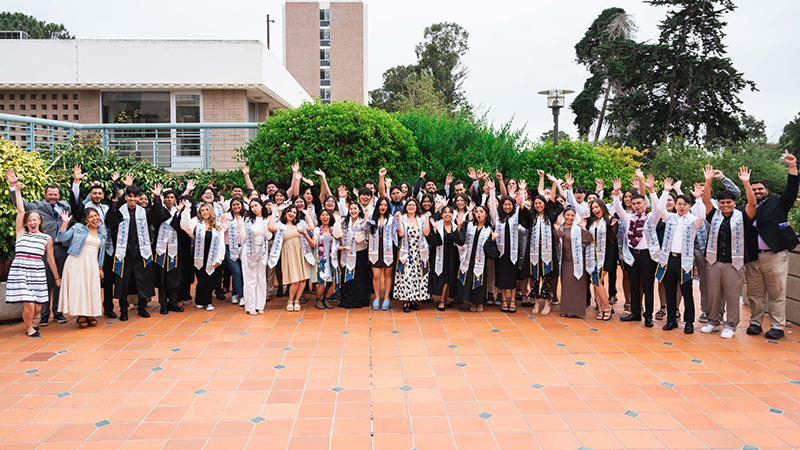Programs at several UC locations win NASH Catalyst Fund awards
Share This Article

In late July, the National Association of Higher Education Systems (NASH) named the 32 recipients of its latest Catalyst Fund awards.
In this funding round, the awards — supported by the Evelyn and Walter Haas Jr. Fund and totaling $220,000 — recognize initiatives within California’s public higher education systems that are aimed at removing cost as a barrier to college through innovative practices that enhance affordability and support equitable access. The Catalyst Fund focuses on discovering programs that demonstrate the potential for replication and scale, with the goal of sharing them across NASH’s extensive network of nationwide school systems.
“We are thrilled to recognize innovative initiatives across all three of California’s public higher education systems. With NASH’s support these institutions are breaking down financial barriers, making higher education more accessible and affordable for all students,” said Jessica Todman, executive vice president at NASH. “This investment is a testament to our commitment to fostering student success and sharing best practices across our extensive network through the power of systems. We hope the insights gained from this work will enable us to scale evidence-based interventions beyond California, as the collective efforts of all our systems aim to advance prosperity for the nation.”
“By focusing on affordability and access, we can provide more equitable opportunities across our campuses,” said Michael Drake, M.D., UC president. “NASH’s support allows us to continue implementing innovative strategies that reduce financial barriers for our students. This work exemplifies our shared commitment with NASH to advancing educational success and inclusivity.”
Award-winning UC programs
Congratulations to the UC staff and faculty who contributed to the following initiatives and programs.
UC Berkeley
Recovery at Cal / UC Berkeley Collegiate Recovery Program (CRP) Recovery Scholar Program
The UC Berkeley Recovery Scholars Program provides financial support via a modest stipend to students who are active recovery advocates on campus. It is supported by data that indicates that students in such programs have a higher graduation rate (90%) than the general population (61%). It provides a direct financial incentive to ensure participation in recovery programming and consistency of engagement with peer support groups.
UC Davis
Student Housing Reservation Fee Offset
UC Davis used data to identify a problem: The percentage of students eligible for student housing reservation fee waivers was much higher than the percent of students applying for them. Operational changes have enabled the process to become automated and removed bias and stigma, while significantly increasing usage (34% of students received an automatic fee waiver in 2023 compared to 3% prior to the intervention).
Equitable Access Flat-Rate Textbook Program
UC Davis took a unique approach to addressing textbook costs. They recognized that it is inequitable for students to pay significantly more for textbooks based on their major or degree path. For example, texts for STEM courses are traditionally costly, and this can prevent low-income students from persisting in the degree path of their choosing. Davis has implemented average per-term pricing for course content which complements state efforts to ensure equitable tuition models. This was an intentional effort to move from a profit-driven model to a student-centered model.
UC Merced
Enrollment Coach Program
UC Merced assigned peer coaches who leverage a variety of communication tools to prevent post-admission non-enrollment or “melt.” The coaches guide students through matriculation and connect them with resources to address concerns regarding financial aid and other costs, helping new students overcome challenges they encounter over the summer before the semester begins.
UC Santa Barbara
After-Hours Childcare During ‘Dead Week’ and Finals Week
UC Santa Barbara’s childcare program subsidizes childcare to help support undergraduate and graduate student parents retain and persist through graduation. Staff identified a specific need based on feedback from student parents to provide after hours childcare during “dead week” and “finals week” so they have the coverage they need to focus on their studies during high pressure periods in the semester.
“It is well documented that the journey to and through college is challenging for many students, but it is even more challenging for student parents as they juggle academic demands while also raising children,” said Annette Suding Muse, director of Early Childhood Care and Education Services at UC Santa Barbara.
Promise Scholars: The Key to Success for Low Income, First Generation, and Underrepresented Students
Promise Scholars are first-generation college students who, through this program, are provided with predictable financial aid for their full four years (or two years for transfer students). UC Santa Barbara provides a high-touch wraparound model that can be tailored to students including connection with basic needs support, intrusive advising, help with study habits and research, job prep, etc. This combination of financial support and wraparound services ensures that students will have what they need academically to persist.
UC Office of the President
Path to Debt-Free UC
UC financial aid typically asks students to contribute to covering the cost of their own education — including indirect costs like rent, food, books, etc. — through a combination of part-time work and student loans. Under the Path to Debt-Free program, financial aid packages are augmented so that students, if they so choose, can finance their college education with part-time work alone. This program is complementary to the state’s Middle Class Scholarship to further support affordability and prevent students from taking on debt. It already demonstrates results: UC is tracking the number of individuals with a debt-free financial aid package (22,000 over two years) and the annual borrowing rates. In 2022-23, 28% of California undergraduates borrowed compared to the 37% who borrowed in 2019-20, which is the last year unaffected by the pandemic.
